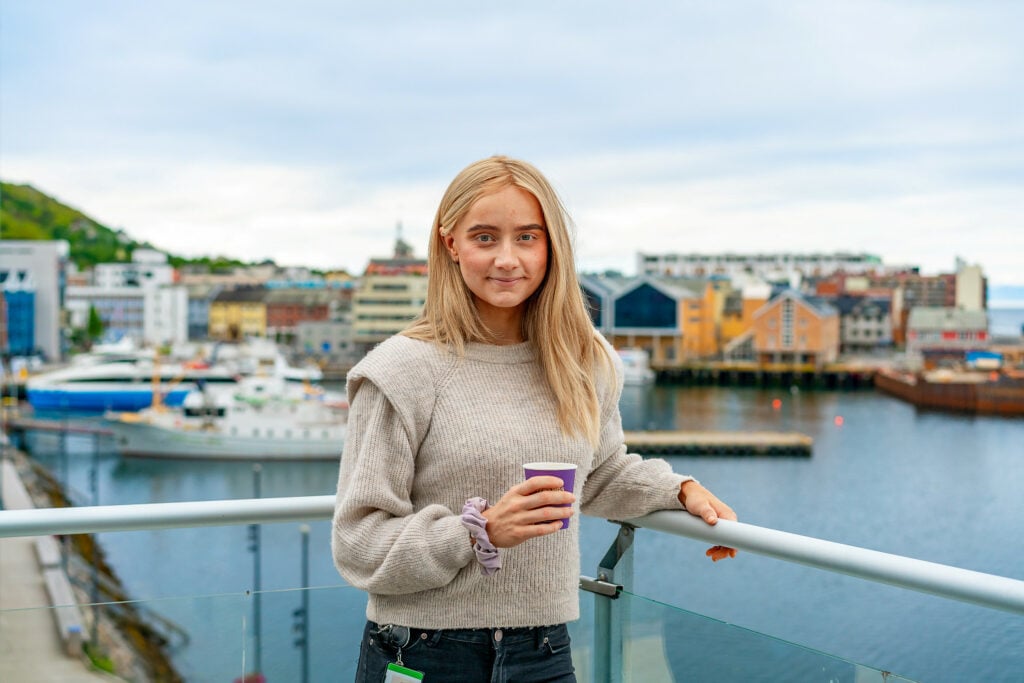
24 April 2024
20-year-old Agnete enjoys the offshore life
Agnete Svanholm is a process operator on the Goliat platform in the Barents Sea. She works 12-hour shifts, two weeks on and four weeks off, which is the offshore standard.
“What motivates me to work for Vår Energi is that every day on the job is exciting, varied and meaningful. And there’s always something new to learn and a new challenge to tackle, as well as a very good working environment, which makes for enjoyable work periods,” she says.
Agnete completed one year of Technology and Industrial studies (TIP) and one year of Chemical Processing at Hammerfest Upper Secondary School. After completing her two-year apprenticeship on the Goliat platform, she recently passed her trade examination and is a full-fledged process operator.
“I’m very happy here and look forward to continue learning in the field,” she says.

Varied and dynamic workday
A typical workday in the life of a process operator is from 0700-1900 hours or 1900-0700 hours, and starts and ends with a handover.
“The day starts with an update from the previous shift and a plan for the day’s tasks. Then we carry out inspection rounds to check for irregularities. If I’m in the CCR (Central Control Room), I start by analysing display interfaces to make sure everything is normal. The work day varies, depending on ongoing projects, and ends with a handover to the next shift,“ Agnete says.
An important part of the job as process operator is ensuring that oil and gas production is running smoothly, either through direct involvement out in the field or through monitoring and coordination from the control room.
“In the field, you usually get assigned an area in the process, and this involves activating work permits and having an overview of ongoing jobs, as well as any routines or jobs that need to be prepped. In the control room, you need to have an overview of the process, and coordinate and assist field operators as needed,” she says.
New technological advances mean that everyone needs to take the time to learn new things, which Agnete thinks is positive.
“This ensures that we stay current, which contributes to new learning and knowledge,” she says.
Good working environment
The 20-year-old from Hammerfest is very pleased with working offshore and particularly notes the good working environment on the platform.
“The cooperation between colleagues is very good and you never need to be afraid to ask for help with anything. There’s always room to make suggestions on any jobs or tasks,” she says.
She has no problems combining work and time off with long periods offshore.
“The biggest challenge working offshore is the things you might miss in your private life when you’re at work for two weeks, but at the same time, you’re prepared for this when working shifts. The advantage is having a predictable shift rotation, so you can plan your time off, which makes it very satisfying to come home,” she says, adding that two weeks can fly by once you get used to it.

Suggests other women should give it a shot
Agnete’s goal is to become as good as possible in her field, and she plans for a long career in the industry.
“As a skilled worker, I plan on acquiring solid experience in my first working years, and then exploring the opportunities that come up. Whether it leads me back to school to continue my studies or to exciting projects, I look forward to the new and inspiring challenges that will contribute to my further development,” she says.
Do you have any advice for young women considering a career in the oil and gas industry?
“If you think this is something that seems interesting and could be exciting, don’t be afraid to give it a shot. At the very least, you’ll learn more about the discipline and what it entails. Remember that it’s never too late to change direction,” she says.
As for herself, she’s never regretted her career choice.
“I’m very glad I took the chance. Through my schooling and apprenticeship, I really discovered my passion for the discipline, a sense of achievement and contentment with the job. If I hadn’t tried, I most likely would’ve never found that,” says Agnete Svanholm.


